PowerPoint is a widely-used tool in many industries for creating and delivering presentations effectively. However, sometimes the presentations take up a significant size due to more graphical content, eventually making them difficult to store or share. Moreover, such large-sized PPT files often impact the live presentation's performance.
Therefore, if you are also looking for ways to compress the PPT file size, then this guide has your answer. Here we will discuss in detail the 10 effective ways to reduce or compress PPT file size, starting with the best method to reduce the size significantly with the powerful UPDF tool. So, let's get started!
Part 1. Why Compress PowerPoint File Size?
Different users have reported different reasons behind compressing the PowerPoint file size. Below are some of the common reasons when it becomes crucial to compress PPT file size:
- You have limited storage capacity and want to save storage space.
- You want to make uploading and downloading PPT files easier for smooth sharing with others.
- You want to reduce email attachment size.
- You want to make the PPT file accessible to everyone, even with slow internet connections.
- You want to avoid delays or glitches while delivering a live presentation.
In short, numerous reasons can urge the need to compress PowerPoint file size. So, let's now shift our focus to how to compress PPT file size.
Part 2. The Best Way to Compress the PPT File Size Significantly
The best way to compress the PPT file size significantly without compromising the quality is by saving the PPT file as a PDF using the built-in "optimize" option in PowerPoint. This can reduce the file size while maintaining the overall presentation quality. Afterward, you can compress the PDF further with the intelligent file size reduction approach of UPDF.
UPDF is a feature-rich and reputed PDF editor tool that offers all the top-notch and advanced functionalities you need to edit your PDF files. One built-in feature of UPDF is file size reduction, where the tool intelligently reduces the file size of the PDF without impacting its quality.
Windows • macOS • iOS • Android 100% secure
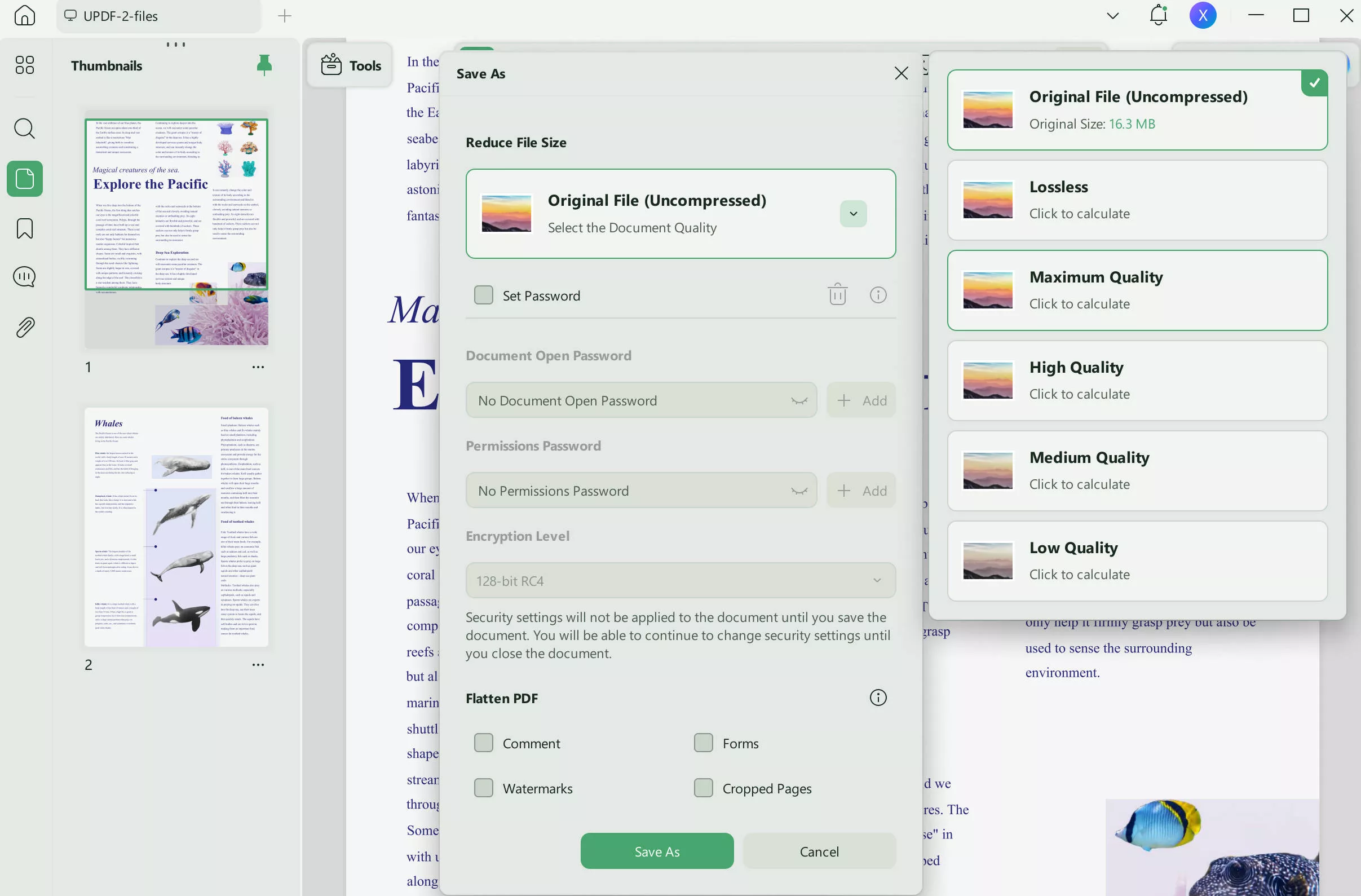
Step 1. First, you have to convert PPT to PDF.
For Windows users, download and use the PPT to PDF creation feature as shown below.
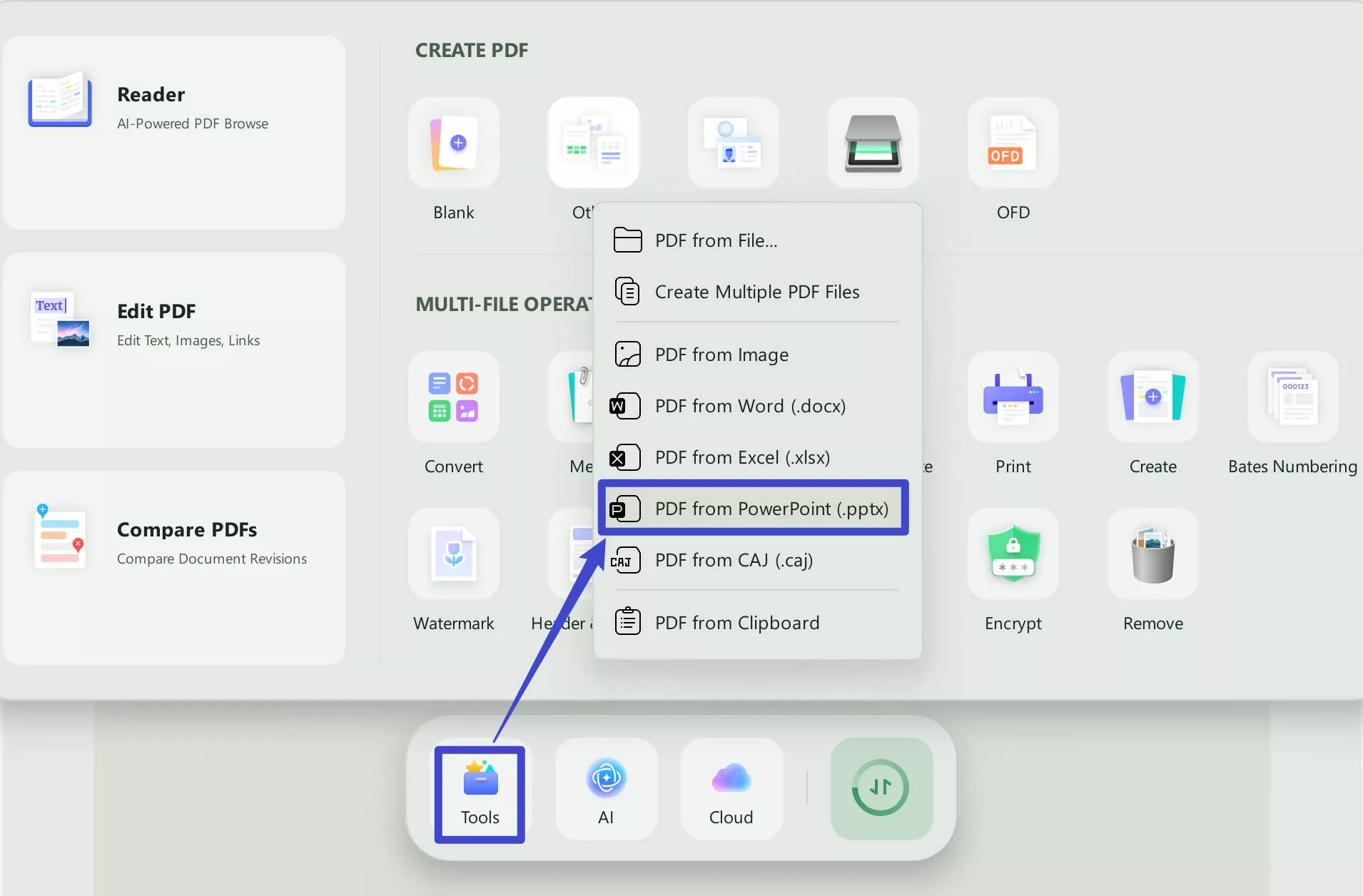
For Mac users or those who prefer an alternative method, open the PPT file, go to File > Save as, choose 'PDF' as the file type, and select 'Minimum size' under 'Optimize for.' Finally, click 'Save' to convert the PPT to PDF.
For Mac users or users who want an alternative method, open the PPT file whose size you want to reduce. Click File > Save as. Choose "PDF" under the "Save as Type" section and then choose "Minimum size" under the "Optimize for" section. Afterward, click "Save" to save the PPT as PDF.

Step 2. Install and launch UPDF on your PC. Open the PDF file. Click the narrow next to save icon located on the right-side toolbar and then choose "Reduce File Size...".
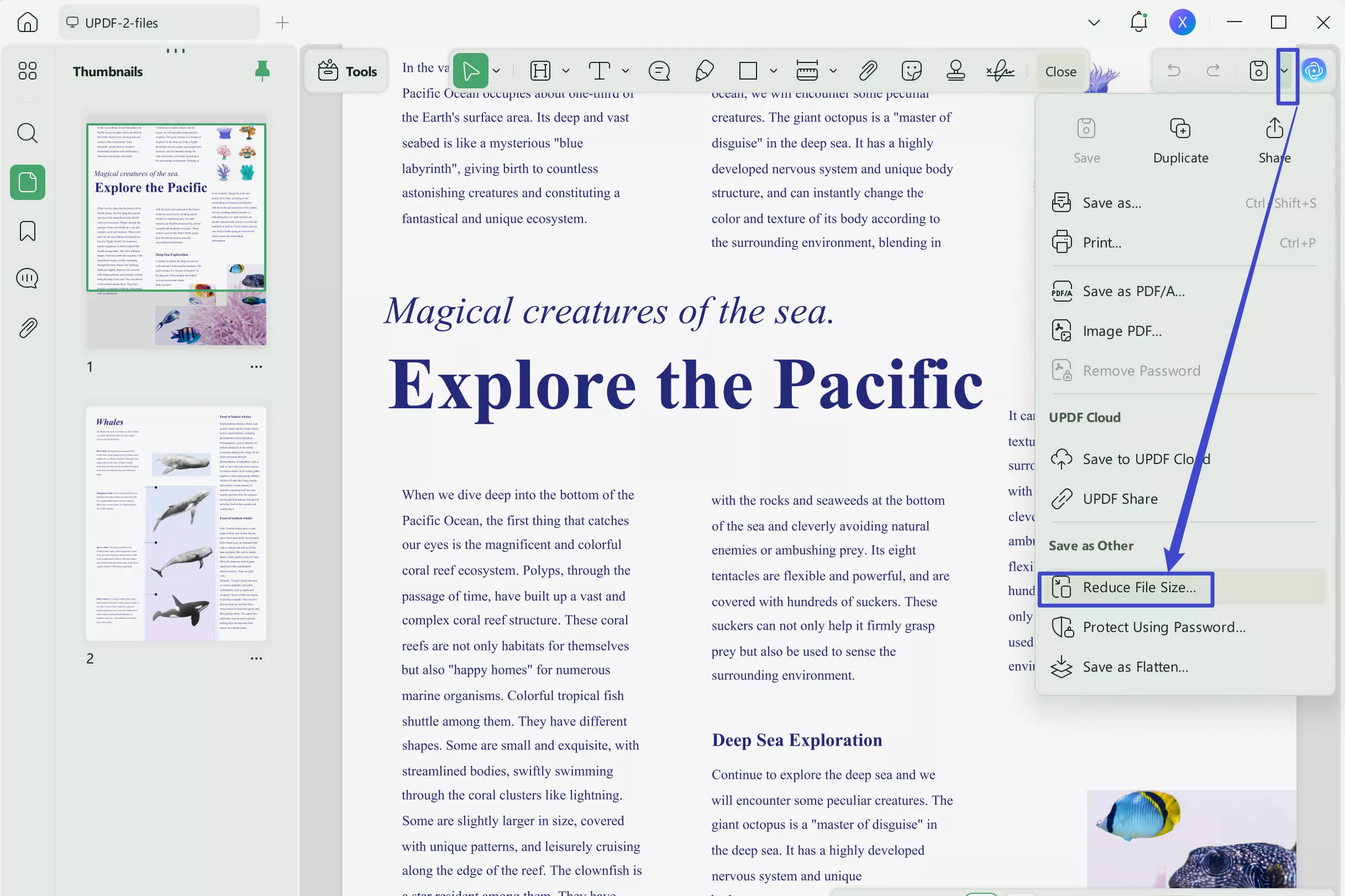
Step 3. Pick one of the output document qualities you prefer and click "Save As".
Step 4. Once the more compressed PDF file is saved on your PC, open it again in UPDF and convert it from PDF to PPT.
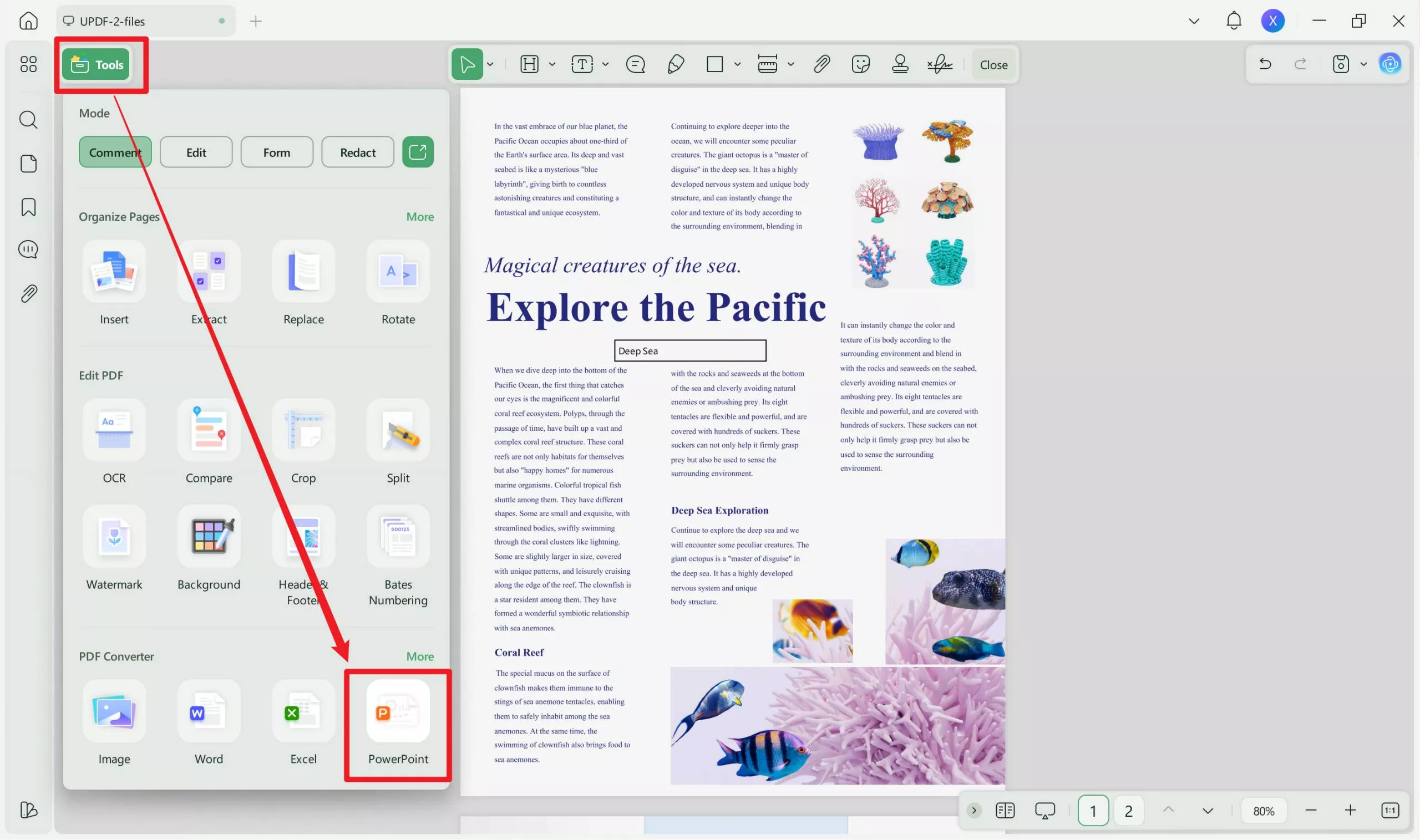
That's it! So, four simple click-based steps can let you easily and instantly compress the PPT file size significantly without compromising the quality.
Other than reducing the file size, UPDF also offers many other state-of-the-art features, as follows:
- Editing: It offers a wide range of PDF editing functionalities, such as editing text and images, adding watermarks and backgrounds, etc.
- Annotating: It includes many PDF annotating capabilities, such as adding shapes, signatures, stickers, stamps, comments, etc.
- Converting: It can convert a PDF into different popular formats, such as Word, PowerPoint, Excel, text, image, CSV, etc.
- Organizing: It streamlines organizing PDF pages, such as adding, replacing, deleting, rotating, splitting, etc.
Overall, UPDF serves as an all-in-one PDF editor you should have on your PC.
Windows • macOS • iOS • Android 100% secure
Part 3. Other Common Ways to Compress PPT File Size
Except for UPDF, you can also compress PPT file size with other common methods. Below are some of the effective ways to do so:
2. Save in PPTX Format
The PPTX format was released with Office 2007 as a replacement for the PPT format. PPTX format makes the file more compressed like a ZIP file, thereby consuming less storage compared to PPT format. So, if your PowerPoint File is in PPT format, then follow the below steps to save it in PPTX format and reduce size:
- Open the PPT file.
- Click File > Save as. Under "Save as type", choose "PowerPoint Presentation". Once done, click "Save".

This way, your PowerPoint file is now saved in PPTX format with a reduced file size compared to before.
3. Compress Pictures
Pictures are an essential part of most presentations. When pictures of high resolution are added to the PPT file, the file size can increase significantly. So, if your PPT file contains many pictures, you should compress them to lower their resolution and reduce the overall file size.
You can compress pictures manually by selecting them one by one and using the "Format Picture" tab from the top. However, there is a much easier way to compress all pictures at once by following the below steps:
- Open the PPT file.
- Click File > Save as. Click the "Tools" button located at the bottom right and pick "Compress Pictures".

- In the compress pictures dashboard, select the resolution you prefer (150 ppi or lower recommended) and also tick the "Delete cropped areas of pictures" checkbox. Once done, click "OK" and save the file.
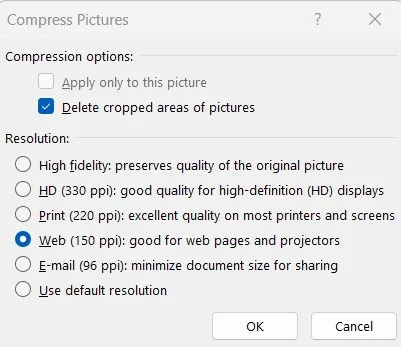
This way, you can instantly compress all pictures in your PPT file and reduce the file size significantly.
4. Use Smaller Size Pictures
The picture size is also directly linked with the PPT file size. Therefore, it is recommended that you use smaller-size pictures. If you want to insert pictures from your smartphone, try to capture them at a lower resolution. Similarly, if you use stock images, try to download lower-resolution pictures. Besides that, you can open the picture in any image editor, like Adobe Photoshop or Microsoft Picture Manager, and save it in a lower resolution.
5. Insert Pictures not Copy/Paste
Instead of copying/pasting or dragging/dropping pictures to your PPT file, it is recommended to "insert" them. It is because when you copy/paste pictures, they can lose compression, might change the file type, and bring additional data with them. You can insert pictures in the PowerPoint by following the below steps:
- Go to the slide where you want to insert a picture.
- Click the "Insert" tab from the top toolbar and then click Pictures > This Device.
- Pick the picture you want to insert and click the "Insert" button.

This way, you can insert pictures and save up unintentional use of storage space.
6. Save Pictures in a Different File Type
The file type in which the picture is saved can also increase its size and the overall PPT file size. So, before you insert a picture into the PPT file, you should convert it into a different file type that consumes less space.
JPEG or JPG format consumes less space compared to other formats because its compression algorithm can significantly reduce the file size. Follow the below steps to save pictures in a different file type:
- Open the picture you want to insert.
- Click the "3 dots" icon from the top right corner and then click "Save as".
- Under "Save as type", choose ".jpeg" and click "Save".
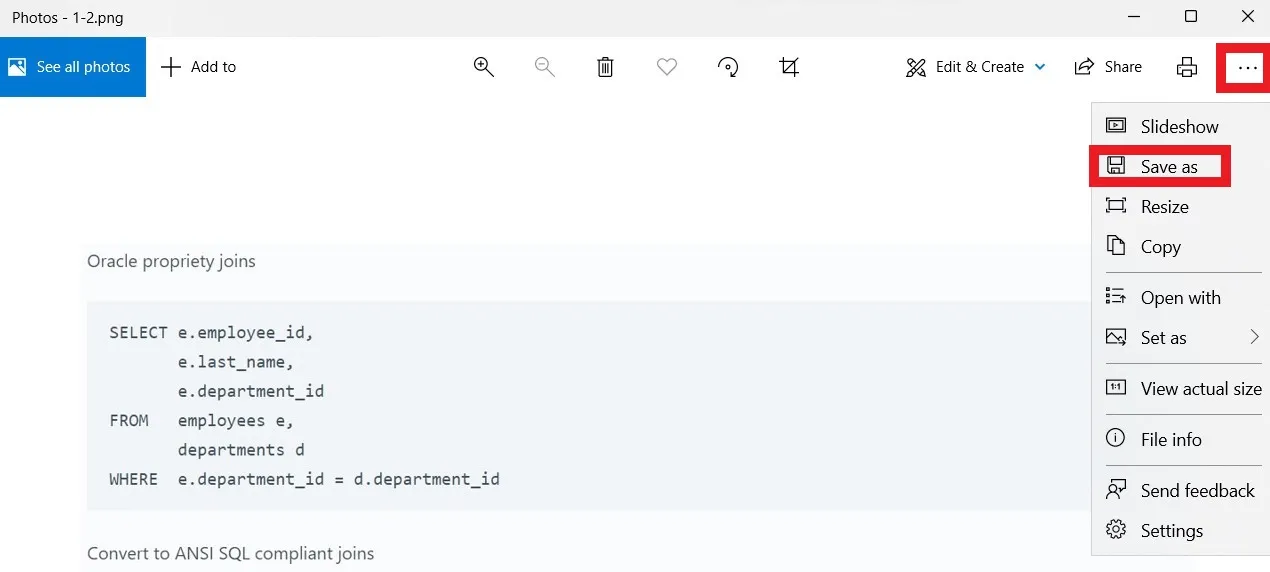
Once you have changed the file type, now go for inserting the pictures.
7. Save a Copy of Artistic Effects Images
For those images where you have applied the artistic effect, PowerPoint will keep two copies of the image, i.e., the artistic effect copy and the original copy. This helps the user to reset the image easily, but it also means an increase in the file size. Moreover, such images don't reduce much size when you compress them.
So, if you have images in your presentation with artistic effects, follow the below steps to reduce their file size:
- Right-click the artistic effect image and click "Save as Picture".
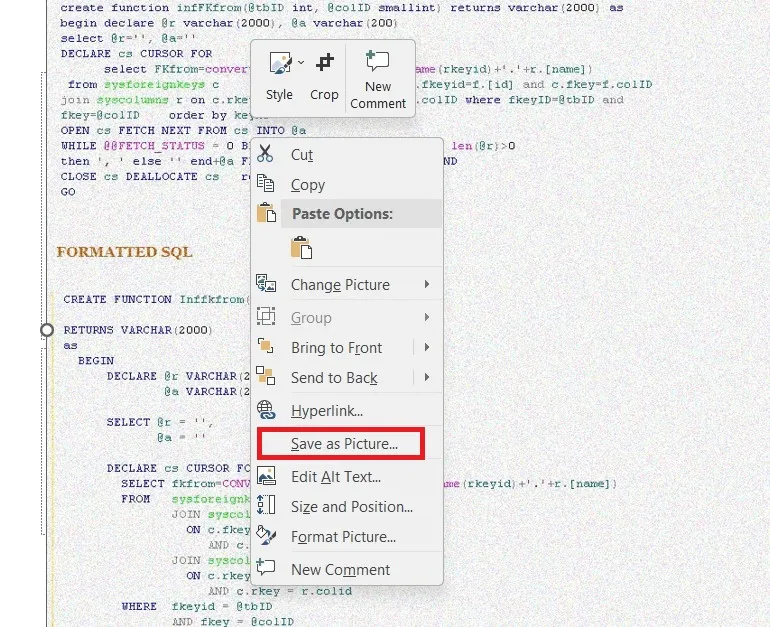
- Choose the location where you want to save the image, select JPEG as the file type, and click "Save".
- Delete the artistic effect image from your PPT file and insert the copy of the artistic effect image you just created.
Delete the artistic effect image from your PPT file and insert the copy of the artistic effect image you just created.
8. Compress Audio and Video
Just like pictures, you can also compress audio and video files in your presentation. So, if you have integrated some audio or video file in your PPT file, then follow the below steps to compress them:
- Open the PPT file.
- Click File > Info. Click "Compress Media" and then choose your desired compression level.
- Wait till PowerPoint completes the compression and then close it.
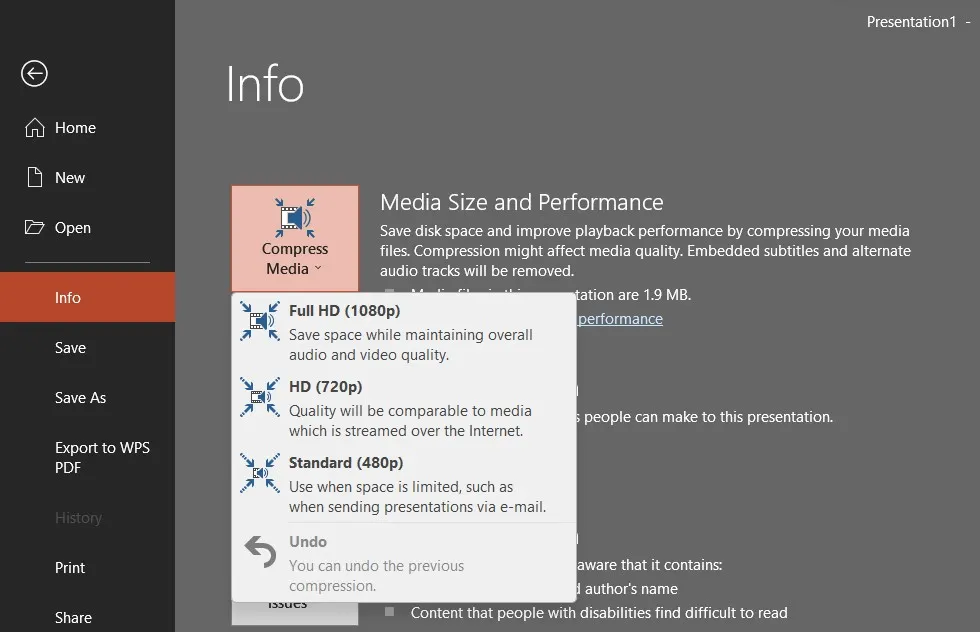
This way, you can compress audio and video files as per your choice and reduce the size of the PPT file accordingly.
9. Compress PPT File as a ZIP File
If you are targeting to reduce the PPT file size to make it easy to share it with others, then compressing it as a ZIP file is an effective way to reduce the size while keeping the images, models, videos, and other elements in the original form. Follow the below steps to compress the PPT file as a ZIP file:
- Go to the location where your PPT file is stored on your PC.
- Right-click the PPT file and choose "Compress to ZIP file".
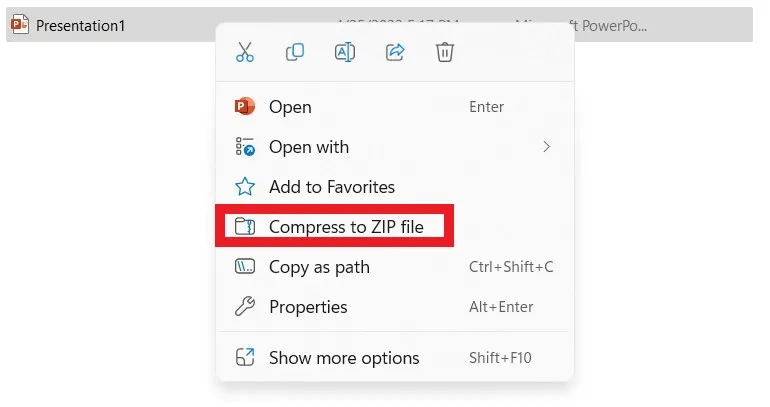
Once the compressed ZIP file is created, you can share it with others easily.
10. Use Online PPT Compressor
The last method to compress PPT file is by using any online PPT compressor. If you Google "online PPT compressor", you will come up with many online tools that can instantly compress the PPT for you and let you download the reduced-size version. Below are the steps on how to use an online PPT compressor:
- Pick the online PPT compressor of your choice.
- Upload the PowerPoint presentation.
- Pick the level of compression you prefer and click the "Compress" button.
- Download the compressed PPT file.

Although this approach looks simple and quick, it raises concerns about privacy and security, as you must upload the file online. Therefore, if you opt for this method, try using a trustworthy service.
Conclusion
When a PowerPoint presentation includes many graphics or data sets, it is not unlikely to see it consuming significant storage space. Although a large-sized PPT file means more resourceful, it brings many challenges. Therefore, it is recommended to compress the PPT file size to address those uncertainties. Of all the methods discussed above, if you intend to reduce PPT file size significantly without compromising quality, UPDF is the best choice. Its intelligent size compression with an intuitive approach does make it the ideal tool for reducing PPT file size. Alternatively, you can test out the other 9 methods discussed in this article and reduce the size as you want.
Windows • macOS • iOS • Android 100% secure
 UPDF
UPDF
 UPDF for Windows
UPDF for Windows UPDF for Mac
UPDF for Mac UPDF for iPhone/iPad
UPDF for iPhone/iPad UPDF for Android
UPDF for Android UPDF AI Online
UPDF AI Online UPDF Sign
UPDF Sign Edit PDF
Edit PDF Annotate PDF
Annotate PDF Create PDF
Create PDF PDF Form
PDF Form Edit links
Edit links Convert PDF
Convert PDF OCR
OCR PDF to Word
PDF to Word PDF to Image
PDF to Image PDF to Excel
PDF to Excel Organize PDF
Organize PDF Merge PDF
Merge PDF Split PDF
Split PDF Crop PDF
Crop PDF Rotate PDF
Rotate PDF Protect PDF
Protect PDF Sign PDF
Sign PDF Redact PDF
Redact PDF Sanitize PDF
Sanitize PDF Remove Security
Remove Security Read PDF
Read PDF UPDF Cloud
UPDF Cloud Compress PDF
Compress PDF Print PDF
Print PDF Batch Process
Batch Process About UPDF AI
About UPDF AI UPDF AI Solutions
UPDF AI Solutions AI User Guide
AI User Guide FAQ about UPDF AI
FAQ about UPDF AI Summarize PDF
Summarize PDF Translate PDF
Translate PDF Chat with PDF
Chat with PDF Chat with AI
Chat with AI Chat with image
Chat with image PDF to Mind Map
PDF to Mind Map Explain PDF
Explain PDF Scholar Research
Scholar Research Paper Search
Paper Search AI Proofreader
AI Proofreader AI Writer
AI Writer AI Homework Helper
AI Homework Helper AI Quiz Generator
AI Quiz Generator AI Math Solver
AI Math Solver PDF to Word
PDF to Word PDF to Excel
PDF to Excel PDF to PowerPoint
PDF to PowerPoint User Guide
User Guide UPDF Tricks
UPDF Tricks FAQs
FAQs UPDF Reviews
UPDF Reviews Download Center
Download Center Blog
Blog Newsroom
Newsroom Tech Spec
Tech Spec Updates
Updates UPDF vs. Adobe Acrobat
UPDF vs. Adobe Acrobat UPDF vs. Foxit
UPDF vs. Foxit UPDF vs. PDF Expert
UPDF vs. PDF Expert



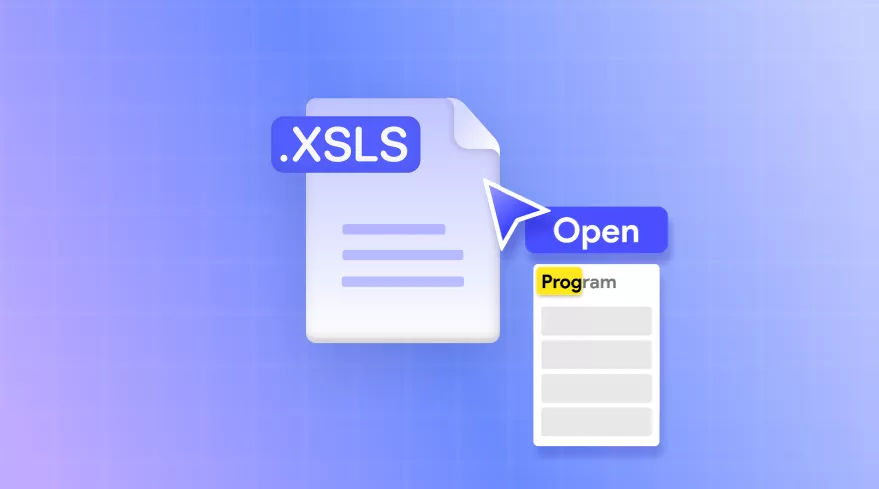



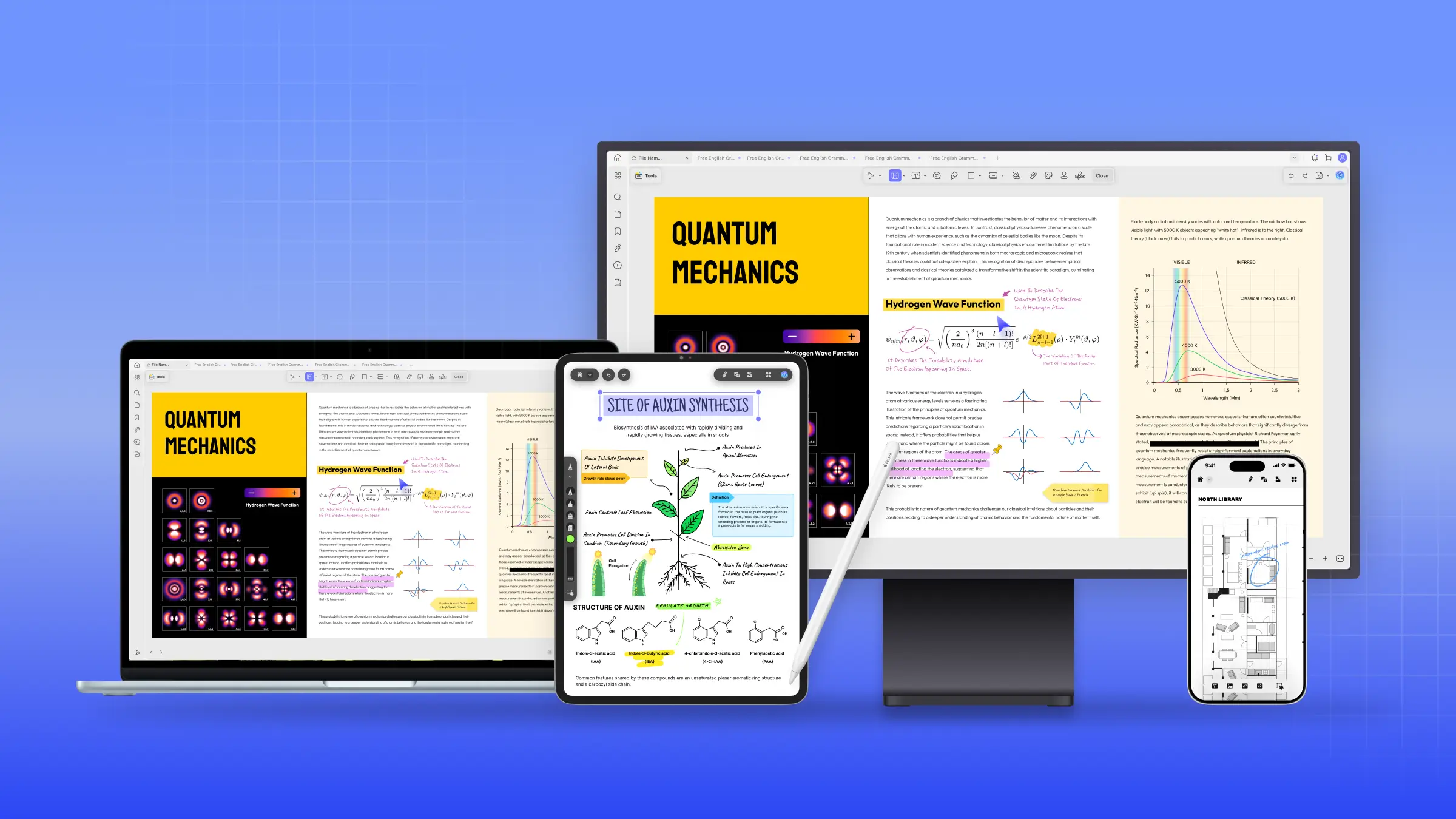




 Enola Miller
Enola Miller 